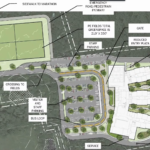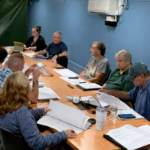The Planning Board at its Monday night meeting urged Grasshopper Energy to revise its stormwater mitigation plan as part of its plan to construct a 2.4 megawatt solar array off Wilson Street, advising that the area underneath the proposed solar panels should not use gravel to prevent runoff.
At the continued public hearing, Grasshopper Energy sought approval for a proposed amendment to a solar special permit as well as a stormwater management permit. While the changes to the layout of the internal access road were not brought up for debate, the issue remained whether the seed mix underneath the densely packed solar panels would be able to get enough light and water to grow, thereby negatively affecting drainage. About 45 people attended the meeting.
Chris King from Atlantic Design Engineers, on behalf of the applicant, said that he had been in correspondence with Phil Paradis from BETA, the town’s engineering consultant, on this issue since the last meeting due to the spacing and height of the panels. They “came to an impasse, so to speak,” he noted, as far as what could grow there.
“There are other ways to stabilize the site, one of which is gravel,” King explained. “It doesn’t sound as magnificent as the pollinator mix that we’re proposing and we stand by. And that is certainly going to be our first option, because there are developer incentives to go with a pollinator certified site.”
He added that the contingency plan provided by Goddard Consulting would use gravel in the areas where the seed does not take to prevent silt from running off into the stormwater system and ultimately into the wetlands. The post-development flows are under the pre-development flows at both the two- and 10-year marks, with the only increase being 4 percent if a 100-year storm were to occur. There also are 2,500 linear feet of shallow infiltration trenches not accounted for in the model “proposed from day one” to help with the sloped areas.
Paradis countered that the soil in that area of town “is very silty” and that the town has had issues with drainage in the Legacy Farms area with other projects.
“We just want to make sure that it’s going to grow and be able to be maintained,” he said, noting the narrowness of space between the panels to perform work. Stone swales are helpful to the project as long as they don’t become filled with sediment, he added.
One option Paradis recommended, which some members of the Planning Board ultimately favored, was that an erosion control matting be installed before the seed is planted.
“If they were to use the gravel or crushed stone, would that address the concerns that you have?” chair Gary Trendel asked.
Paradis explained he wasn’t sure because he didn’t know how thick the gravel would have to be in this type of soil. He said the mat may be “a better solution.”
“The issue with the mat is that, if we put the mat down over the grass seed, the grass seed will be exposed to even less potential light getting under there,” said Mitch Maslanka, a wetland scientist from Goddard Consulting, on behalf of the applicant.
King said that a compromise could be reached, “particularly for the sloped areas.”
Board member Jane Moran asked if there were any type of wildflowers that would grow in gravel. Maslanka said he hadn’t looked into it but could research it.
“This is the kind of stuff that we’d like to work out before we get to this point,” Trendel said of the matting and erosion.
“What my ask would be [is] to work with BETA to come up with a solution that effectively addresses his concerns that [Paradis] is willing to endorse,” he added.
Attorney Anthony McGuinness interjected on behalf of the applicant. He said the stormwater permit had been granted on the existing plan. If it applied to something on the previous plan, it should have been addressed previously, he said.
King noted that time is of the essence on the project, so he asked for a conditional approval of the modification.
Board member Muriel Kramer said she was “a little less comfortable with the use of gravel,” as it had not been mentioned previously.
“We always wanted it to be seeded and be a pollinator friendly field,” she noted.
“Things that should be done by a certain time should be done by a certain time,” added vice chair Rob Benson. “This is not what we as members of the Planning Board are looking for.”
In response, Ahmed Hafez from Grasshopper said the vegetation is planned and the gravel is “a hypothetical situation.”
“Gravel is not a contingency plan to growth,” Kramer countered.
Ted Barker-Hook of the Conservation Commission said he was concerned about setting a precedent if the project was approved on a contingency.
“It seems the root issue is the density of solar panels,” he said. “If this project is approved, other solar developers may use this project as a template.
The applicant decided to withdraw and work with BETA until the next Planning Board meeting in two weeks.
McGuinness opined that “the goalposts keep getting changed,” but Trendel disagreed.
“There was not resolution between two weeks and today,” Trendel said, “and that’s still an issue. In my opinion, the goalposts have not moved there.”






















0 Comments